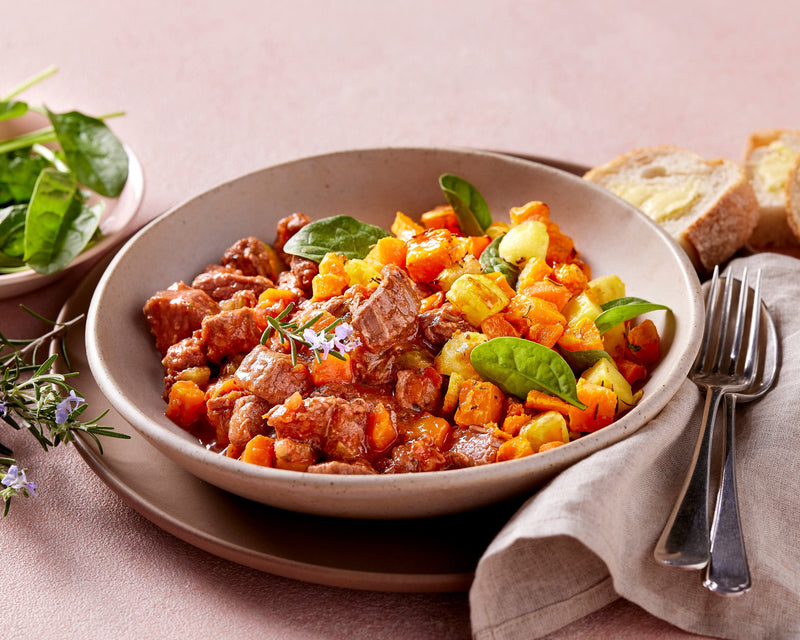For too long, potatoes have been unfairly shamed by the specter of 90s diet culture and the anti-carb brigade. But let's set the record straight: potatoes are absolute legends—in the kitchen and in terms of nutrition. Whether they’re mashed, roasted, wedged, baked, turned into gnocchi, or transformed into golden tater tots, potatoes deserve their moment in the sun.
In fact, back in 2008 the United Nations declared it the International Year of the Potato in recognition of its role in combating global hunger and poverty. With their incredible adaptability, affordability, and impressive nutrient profile, spuds have become a staple crop in food-insecure regions (Jansky, 2019). Not all heroes wear capes—some come with crispy skins.
So let’s dig into why you can feel great about eating potatoes.
1. Packed with Nutrients, Vitamins & Minerals (Yes, Really)
Let’s talk carbs first. One medium potato (about 150g) contains ~26g of carbohydrates. The Australian dietary guidelines recommend 225–325g of carbs daily—because carbs = energy. And yes, we need energy to survive, thrive, and chase after our dreams (and sometimes toddlers).
Here’s what else you’ll find in one humble potato:
-
Magnesium (43.5mg) – Supports bone health, muscle and nerve function, and helps regulate blood sugar and blood pressure.
-
Potassium (864mg) – Crucial for hydration, muscle contractions, and healthy blood pressure.
-
Vitamin C (28.5mg) – An immune system booster that also helps with cell repair and development.
-
B Vitamins – Includes B3 (Niacin), B9 (Folate), and B1 (Thiamin), which all help with energy, metabolism, and brain health.
Pro tip: A lot of these nutrients hang out in the skin, so think twice before peeling!
2. They’re Natural Antioxidant Boosters
Potatoes contain antioxidants like vitamin C and polyphenols, which protect your cells from oxidative stress. Antioxidants have also been linked to gut health benefits, helping shield your digestive tract from damage and inflammation. You can learn more about antioxidants here.
3. Gut-Loving Goodness
Potatoes contain both fibre and resistant starch, making them great for digestion. The skin alone provides about 3.6g of fibre, which contributes to the recommended 28–38g daily intake.
Resistant starch is especially powerful—it feeds the good bacteria in your gut, supports colon health, stabilizes blood sugar levels, and can even help reduce inflammation (Jansky, 2019).
4. A Surprising Ally in Weight Management
Because of their fibre and resistant starch content, potatoes can help you feel fuller for longer and stabilize energy levels—helping to reduce snacking and sugar cravings.
Of course, preparation matters. Baked, roasted (with olive oil), boiled, or lightly mashed are the best options. Deep-fried? Save that for your pub night parma.
And remember: no single food will magically cause or prevent weight gain. A sustainable, healthy lifestyle includes balance, movement, and maybe a chat with a health professional if weight is a concern.
5. Coeliac Certified
Unlike many other starchy carbs, potatoes are 100% gluten-free—making them a safe and satisfying option for people with coeliac disease or gluten sensitivity.
So... How Should You Eat Them?
The best way to enjoy potatoes is alongside a varied, balanced diet full of fresh, whole foods. Healthy cooking methods include:
-
Boiled
-
Baked
-
Roasted with olive oil
-
Mashed (go easy on the butter)
And yes, chips, gems, and crisps still have a place—just maybe not at every meal.
Shop The Story
🥔 Tender Beef Fillet with Pepper Sauce Roasted Chat Potatoes and Green Beans
🥔 Beef Bourguignon with Roasted Mash Potatoes
🥔 Smokey Chicken with Roasted Chat Potatoes, Corn & Black Bean Salsa
🥔 Chicken Cacciatore With Mixed Potato Mash
🥔 Grass Fed Beef with Chimichurri Salsa and Chat Potatoes
🥔 Tandoori Chicken with Roasted Spiced Cauliflower and Chat Potato
Reference:
Jansky, S., Navarre, R. & Bamberg, J. Introduction to the Special Issue on the Nutritional Value of Potato. Am. J. Potato Res. 96, 95–97 (2019). https://doi.org/10.1007/s12230-018-09708-1
Nutrient Reference Value Australia and New Zealand:
https://www.nrv.gov.au/chronic-disease/summary
The Good Mood Food:









